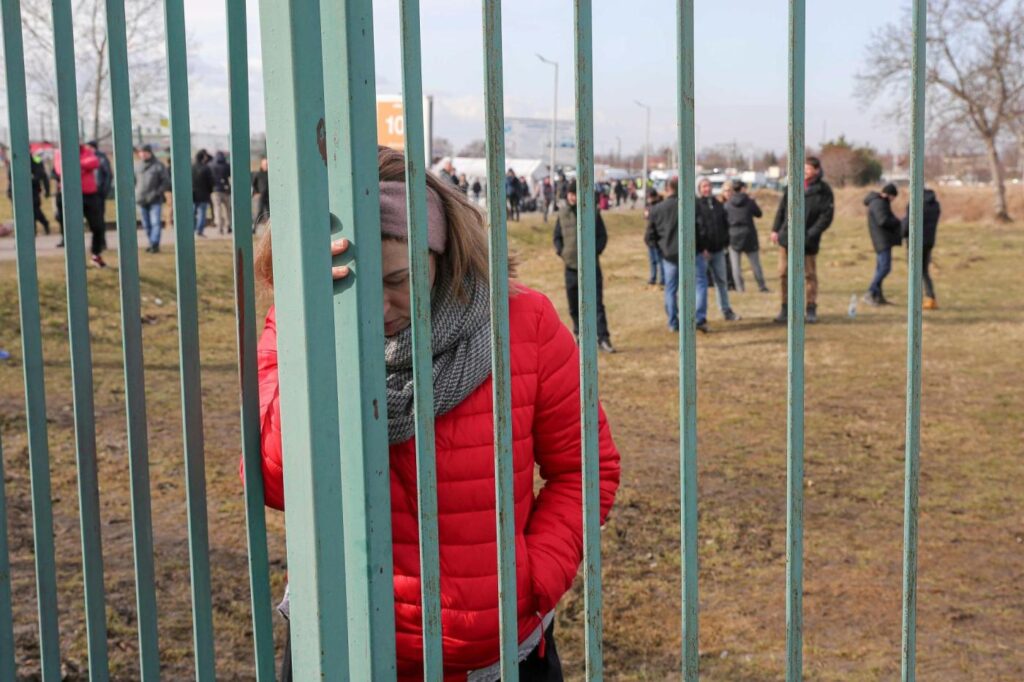
By SRDJAN NEDELJKOVIC and DAVID KEYTON
MEDYKA, Poland (AP) — As Russia launched its war in Ukraine last month, exhausted and frightened refugees streamed into neighboring countries. They carried whatever they could quickly grab. Many cried. They still do.
The United Nations says that more than 3.6 million people have fled Ukraine since the war started exactly one month ago Thursday, in the biggest movement of people in Europe since World War II. Most believed they would soon be back home. That hope is waning now.
“At the beginning, we thought that this would end pretty soon,” said Olha Homienko, a 50-year-old woman from Kharkiv. “First of all, nobody could believe Russia would attack us, and we thought that it would end quickly.”
Now, Homienko said, “as we can see, there is nothing to look forward to.”
Homienko’s hometown is among several cities and towns that have been encircled and shelled heavily by the Russians. Refugees coming from besieged towns have told of destruction, death and hunger.
Natalia Lutsenko, from the bombed-out northern town of Chernihiv, said she still thought the Russian invasion must be some kind of “misunderstanding.”
Lutsenko said she couldn’t see why Russian President Vladimir Putin wants to make Ukrainians suffer so much.
“Why is he bombing peaceful homes? Why there are so many victims, blood, and killed children, body parts everywhere?” Lutsenko pleaded. “It is horrible. Sleepless nights. Parents are crying, there are no children any more.”
After fleeing her home, Lutsenko came to Medyka, a small town on the border between Ukraine and Poland where refugees have been coming since the start of the invasion.
Medyka Mayor Marek Iwasieczko clearly remembers Feb. 24, the first day of the war.
“That day was a big surprise for me. Suddenly (a) huge number of people appeared in Medyka,” Iwasieczko recalled. “They came terribly exhausted, it was still cold, they were freezing.”
Though Medyka authorities had prepared some facilities in advance, the town was still overwhelmed with the thousands of people arriving at the same time and needing shelter, food, medicines — and, most of all, warmth and comfort.
Iwasieczko also said everyone had believed to the last moment that war could be avoided.
“Everything was prepared, even though we were not sure whether all this would be necessary,” he said. A month later, “we are dreaming about the stabilization and the end of this situation … We are tired but we are going to help until the end.”
In Przemysl, another Polish town where refugees arrive by train, 66-year-old Nelya Kot from Chernihiv said she remembers waking to the sound of air raid sirens and explosions when the war started on Feb. 24.
“I thought maybe it was a drill, but then realized that … you wouldn’t hear explosions,” she said. “At that moment my daughter called and said ‘Mom, Russia has attacked us.’”
One month later, Kot added, people in Chernihiv are drinking river water to survive. Her nephew was killed while waiting for bread, and devastation is everywhere, she said.
“Today, there is no water, no gas, no electricity (in Chernihiv),” Kot gasped. “People are in total isolation, they drink water from the Desna river.”
To ease the strain on its member states accepting refugees, the European Union announced moves Wednesday to help them assist the millions of refugees in accessing schools for their children, health care, accommodation and work.
The measures also aim to facilitate the movement of refugees between countries that can house them in the EU and other countries such as Canada and the United Kingdom, which already have large Ukrainian communities.
Mostly women and children — Ukrainian men aged 18-60 have been banned from leaving the country and stay to fight — the refugees have sought to rebuild their lives in neighboring countries, seek jobs and start school. Some have moved on other nations where they have relatives.
Maria Tykha, a 29-year-old refugee from Kharkiv, still doesn’t know what he will do next. After arriving Thursday at Przemysl by train, she said “I just can’t believe that it is possible in the 21st century.”
In Medyka, the refugees are still arriving, though in smaller numbers and in warmer weather. On Wednesday, children could be seen clutching their favorite toys, women carrying babies and people arriving with their dogs.
Volunteers on Thursday sought to go beyond just offering safety and immediate help — the Dream Doctors organization from Israel brought in clowns for the children, while Humane Society International distributed pet food.
The United Nations children’s agency says half of Ukraine’s children — 4.3 million from an estimated 7.5 million — have now fled their homes, including 1.8 million who have left the country.
Lutsenko was sitting on her bed in a sports hall that has been turned into a refugee center, with dozens of beds lined up in one central area. She too had thought the war would be over in just a few days.
“Nobody thought it would last this long, for a month.,” she said. ” I believe that Ukraine will win and I believe in our army. I still believe.”
____
David Keyton reported from Przemysl.
____
Follow the AP’s coverage of the war at https://apnews.com/hub/russia-ukraine
